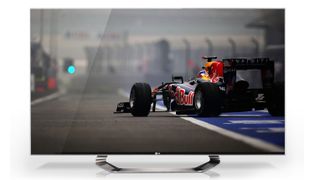'Television needs to break out of the bezel'
Do TVs need to be constrained within a traditional panel?

Will TVs continue to be a lean-back, single panel experience, Simon Parnall, technology vice-president for NDS, doesn't think so. He's working on a project called Surfaces that he spoke to us about during the recent Future World Symposium taking place at Wembley Stadium.
Surfaces is, according to Parnall, "how we think TV will evolve based on the the way displays are evolving. It's amazing how much displays are reflecting what science fiction has shown us."
Tech companies often talk of Minority Report-style smart walls being the future, but Parnall says NDS is planning to make it happen.
However, he says, it needs to happen at a low cost. "People spent 5 to 10 per cent of the value of the house on a new TV set in the 1970s – can you imagine doing that today?"
Surfaces is a 3.6 metre-wide bezel free display that uses five-six LCD displays to show a variety of information. It's all context-specific.
As Parnell says, it's about "breaking out of the bezel. Television needs to move out of the frame. You will be able to see a wall that blends in, that's unobtrusive."
In terms of resolution, the displays in the prototype are 1K each, meaning 6K for the lot. However, Parnell continued to say that other technologies will make Surfaces even more exciting. "The combination of OLED technology and eInk will enable you to have a screen that lives with you for very low power.
Get daily insight, inspiration and deals in your inbox
Get the hottest deals available in your inbox plus news, reviews, opinion, analysis and more from the TechRadar team.
Complete interaction
"Everybody in the family can have their own device and interact with the surface, everybody getting their own experience. You don't have to be rectangular, you can have video of any size cutting into the wall.
"We don't want a PC-like experience that needs you to move things around the wall. We want an engine that gives you an immersive experience.
"We want to support different resolution surfaces, offer different levels of immersion. You'll be able to put up an image that's real size – the size stays the same, the screen size changes.
But interestingly, Parnell believes natural user interaction can only go so far. "I'm not big on gesture control. I think the remote control or touch. There may be some scope for voice, lets; see how that evolves."
Interestingly, NDS believes that Surfaces could have some interesting implications in terms of people being socially isolated – such as the elderly. Could they interact with Surfaces easier than they could with a PC or mobile phone, for example?
Dan (Twitter, Google+) is TechRadar's Former Deputy Editor and is now in charge at our sister site T3.com. Covering all things computing, internet and mobile he's a seasoned regular at major tech shows such as CES, IFA and Mobile World Congress. Dan has also been a tech expert for many outlets including BBC Radio 4, 5Live and the World Service, The Sun and ITV News.
